Did you just open an email that starts with “Greetings! This email concerns your information security and account safety“? Beware, because this is a scam — a frightening but common attempt known as “sextortion“, where scammers claim they’ve accessed your devices and threaten to distribute compromising videos unless you pay them, usually demanding payment in Bitcoin. These emails play on fear and seek to exploit victims for money, but the threats are often empty.
If such a message lands in your inbox, stay calm and don’t respond. Read our article to learn more about how to recognize these scams, what steps you should take to protect yourself, and how to prevent future attacks.
Here’s an example of the “Greetings! This email concerns your information security” email:
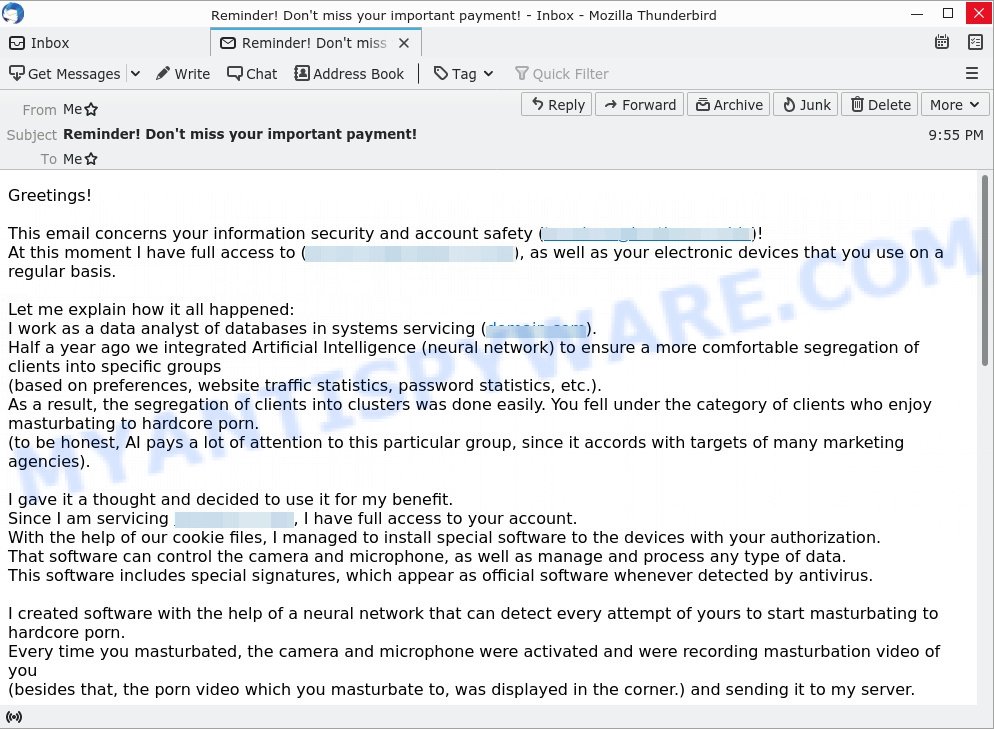
Table of Contents
Is this a scam email?
YES, the email you received falls into the category of a scam email, specifically a type of threat known as “sextortion”. This scheme relies on instilling fear by claiming that the scammer has compromising information or media that they will release unless you pay them. It’s designed to shock and coerce the recipient into acting hastily and paying a ransom, typically requested in cryptocurrency. The claims made in these emails are usually false, and there is no actual evidence that the scammer possesses any damaging information about you.
Red-Flags Indicating It’s a Scam:
- 🤥 No Proof Provided: While the email claims to have compromising videos, it fails to provide any tangible proof. Genuine breaches would likely be accompanied by actual evidence, which scammers don’t have.
- 👾 Claims of Advanced Hacking: The email alleges that the scammer used a neural network and special software to hack your devices. This kind of language is intended to exploit a layperson’s fear of complex technology, but real hacking rarely involves the attacker openly disclosing their methods.
- 🎥 Threats to Release Videos: The scammer’s threat to distribute videos to your contacts is designed to provoke immediate anxiety. However, this is a common intimidation technique, and if they had such material, they would likely show it to you to ‘prove’ their capability.
- 📝 Grammatical and Spelling Mistakes: Many scam emails contain noticeable language mistakes. This is often because scammers may not be native English speakers or because they are hastily put together without thorough proofreading.
- 📬 Your Email as the Sender: Scammers can make an email appear as if it’s coming from your own address. This is known as “email spoofing” and is done to add a layer of credibility to their claims. It’s a technical trick that doesn’t actually indicate they’ve accessed your email account.
In short, the email is a scam. Scammers are using your own email address to try to intimidate you, but this is just a tactic to make you worried enough to pay them. Do not engage or pay any money. Delete the email immediately, update your passwords, especially if you’ve used the same one for multiple accounts, and activate two-factor authentication where possible. Report the incident to your email provider and consider alerting the relevant cyber crime authorities in your country. Knowledge is power—stay informed and you’ll stay safe.
How the scam works
When you receive one of these alarming emails, the first question that might pop up is: “How did they get my email“? The answer isn’t as sinister as the scam might imply. 🕵️♂️ Scammers often get hold of email addresses from lists that have been leaked or sold on the dark web, especially after a data breach.
These scammers then send vague threats to a large number of people, hoping to scare a few into believing the lie. 🚫 They keep their messages deliberately nonspecific, never mentioning where they supposedly got your information from. This is to make you worry that it could, perhaps, be true.
Next comes their made-up story. 🎭 They claim they’ve sneaked some kind of spyware into your devices, giving them full access to your personal data. Despite these bold claims, they fail to provide any concrete evidence to back them up.
Finally, they hit you with the demand for a ransom. 💰 They insist on a quick payment through Bitcoin, knowing it’s difficult to trace and recover. The tight deadline is meant to rush you into making a decision without thinking it through, capitalizing on the fear and urgency they’ve tried to instill.
The email read as follows:
Reminder! Don’t miss your important payment!
Greetings!
This email concerns your information security and account safety (xxxxx)!
At this moment I have full access to (xxxxx), as well as your electronic devices that you use on a regular basis.Let me explain how it all happened:
I work as a data analyst of databases in systems servicing (domain.com).
Half a year ago we integrated Artificial Intelligence (neural network) to ensure a more comfortable segregation of clients into specific groups
(based on preferences, website traffic statistics, password statistics, etc.).
As a result, the segregation of clients into clusters was done easily. You fell under the category of clients who enjoy masturbating to hardcore porn.
(to be honest, AI pays a lot of attention to this particular group, since it accords with targets of many marketing agencies).I gave it a thought and decided to use it for my benefit.
Since I am servicing xxxxx, I have full access to your account.
With the help of our cookie files, I managed to install special software to the devices with your authorization.
That software can control the camera and microphone, as well as manage and process any type of data.
This software includes special signatures, which appear as official software whenever detected by antivirus.I created software with the help of a neural network that can detect every attempt of yours to start masturbating to hardcore porn.
Every time you masturbated, the camera and microphone were activated and were recording masturbation video of you
(besides that, the porn video which you masturbate to, was displayed in the corner.) and sending it to my server.Basically, modern technologies have progressed to an extent whereby I can use the power of thought and distribute this video to all people who know and love you.
There is nothing to worry about. I faced a similar issue before too.
Previously, my handphone got a virus, which allowed to record me masturbating to a porn video with shemales. =)))I had to pay a big amount to those hackers to avoid that video going public.
Otherwise, I would have to find a valid explanation for my friends. They would not support that hobby of mine for sure…
Well, now I am the one doing similar hacking.That’s why I would like to make a business proposal to you:
You shall pay me $1350 USD. Afterward, I will delete from all my servers the videos with you masturbating, and we pretend like it never happened before.
Otherwise, I will share this video with your entire contact list, which I saved previously.Beware, I can share this file via email as a hyperlink, attach it as a video file, upload it to social media,
or even distribute it to mass media (I have access to a few hacked Utube accounts).To avoid that, you need to send $1350 USD in Bitcoin equivalent to my BTC wallet: 1GmtfRMFdctbJmhNZMgNNEeB7x1L8oKido
It is a very simple task to do, and you can easily find any online cryptocurrency exchange to perform the transaction.
I will delete your video right after I receive the money. Furthermore, I will delete the spyware from your device, and you will never hear about me in the future.
Let’s agree on the deadlines: 2 days (precisely 48 hours) is more than enough.
Right after you open this email, I will receive the notification and the countdown will start.Last, but not least:
Don’t even try to report me to the police. They won’t be able to find me because I use TOR, and Bitcoin transactions cannot be traced.
There is no point in addressing domain.com either because I deleted all the records of database entries and neural network requests
š(those requests were made from the accounts of other staff that I managed to get access to).
Don’t worry, I won’t continue blackmailing you. There is no point in that because there are many other unfortunate people like you.
Besides that, if I wanted, I would do that a long time ago without telling you!If you make any wrong moves, I will share your videos without hesitation.
Remember, you are not the only one who’s unfortunate. Others will learn from your mistakes!
Best of luck!
All in all, this scam uses tricks to make you scared and rushed. If you receive an email like this, do not engage with the scammer and do not send any money. Instead, delete the email and report it to the relevant authorities. It is also important to ensure that your computer has up-to-date anti-virus software and that you use strong, unique passwords for all of your accounts to reduce the likelihood of falling victim to scams like this.
Examples of such scams
Scammers have developed a variety of tactics to intimidate and exploit unsuspecting individuals. Here are a few common examples:
📹 I RECORDED YOU Email Scam
In this scam, the sender claims to have control over your camera and alleges they have recorded you during private moments. They typically demand payment to keep the footage private. Beware: this is a bluff to get you to pay up out of fear.
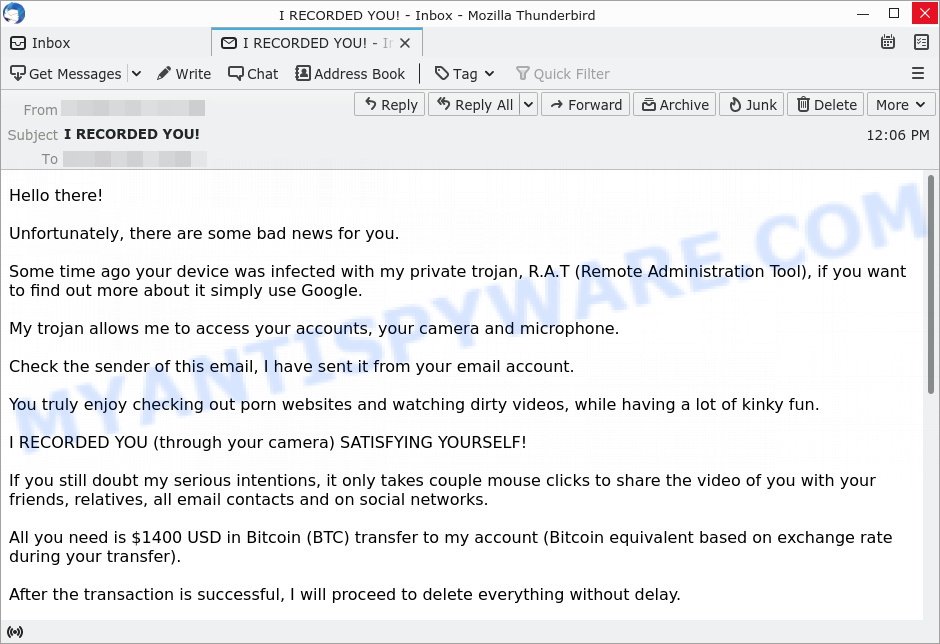
🔒 Your Private Information has been Stolen Email Scam
Here, the scammer will claim they’ve stolen sensitive information from you and threaten to release it unless you pay a ransom. They rely on the scare factor, hoping you’ll pay to protect your reputation, even though they likely have no data at all.
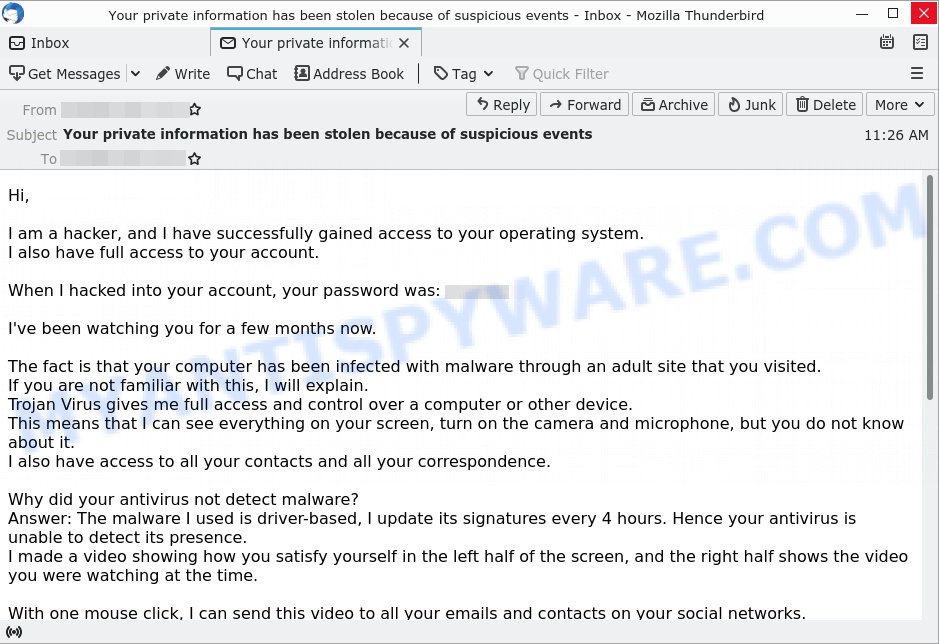
💼 I am a professional hacker EMAIL SCAM
Posing as a hacker, the sender of this email might say they’ve infiltrated your system. They may even claim they have proof of embarrassing activity and will publish it unless you send them money. Remember, a real hacker wouldn’t announce their presence—it’s a tactic to pressure you into paying.
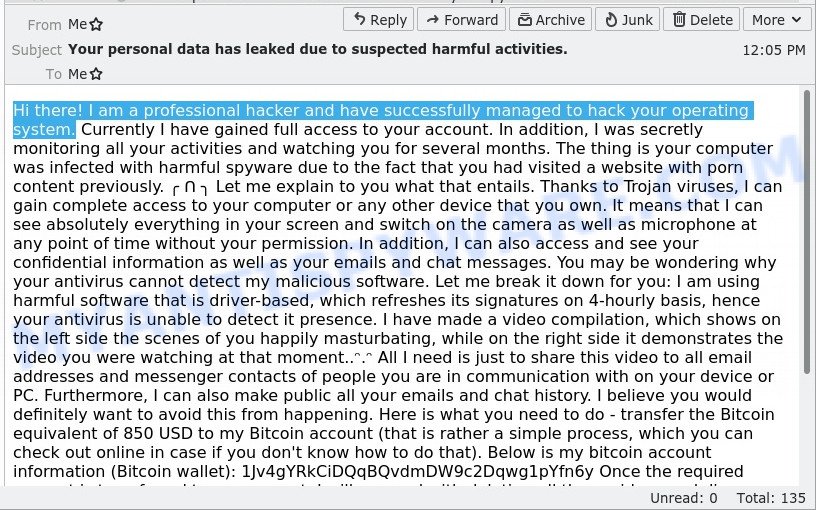
Each of these scams plays on fear and urgency to trick you into acting against your best interest. Always approach such emails with skepticism, verify your security, and do not engage with the scammers.
Should you pay?
No, you should not pay the ransom demanded by the scammer. Remember that this is a scam and paying the ransom will only encourage the scammer to continue their criminal activities! Additionally, paying the ransom can make you a target for future scams. It is important to stay vigilant and protect your personal information from such scams by using strong and unique passwords, enabling two-factor authentication, and regularly updating your computer’s security software. If you receive such an email, it is best to report it to the authorities and your email provider.
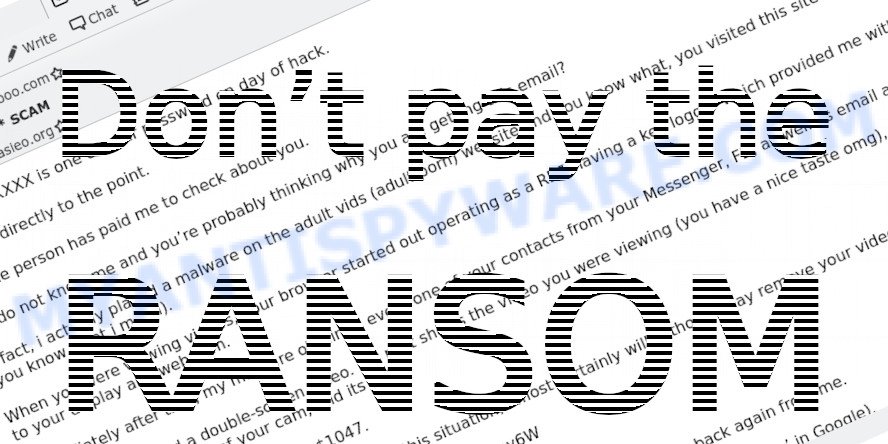
What to Do if You Receive the Email
Receiving the “‘Greetings! This email concerns your information security'” email can be deeply unsettling, but with the right steps, you can ensure safety and peace of mind.

Here’s a specific guide on handling this scam:
Begin by reminding yourself to stay calm. The email is crafted to elicit panic, pushing recipients into rash decisions. Recognize its true nature—a manipulative attempt to exploit fear.
Resist any impulses to pay. Even if you’re tempted to make the problem go away, understand that payment doesn’t guarantee safety. It merely emboldens the scammer, possibly marking you as an easy target for future deceptions.
Do not engage with the scammer. Replying or trying to open a dialogue can inadvertently give away more information, or signal that your email is active, making you a prime candidate for further scams.
Seeing a familiar password can be particularly jarring. If the scam email mentions a password you recognize, it’s essential to check its source. Use services like haveibeenpwned.com to see if your email or credentials have been compromised in any past data breaches.
Subsequent to that, update your passwords. Always choose strong, unique combinations and activate two-factor authentication on platforms that support it.
As a precaution, run a comprehensive security scan on your device. While the scam email’s claims about malware are usually baseless, this step ensures your system remains clean and threat-free.
Report the email to relevant authorities (e.g., FTC). Sharing details with your local law enforcement or cybercrime units can contribute to ongoing investigations and aid in the crackdown on such malicious activities.
Lastly, spread awareness. Inform friends, colleagues, and family about the scam, equipping them with the knowledge to recognize and sidestep such threats. Knowledge, shared and acted upon, diminishes the effectiveness of these scams, making the digital world a bit safer for everyone.
Threat Summary
| Name | ‘Greetings! This email concerns your information security’ |
| Type | Phishing/Sextortion |
| Ransom amount | $1350 USD (in Bitcoin equivalent) |
| Bitcoin Address | 1GmtfRMFdctbJmhNZMgNNEeB7x1L8oKido |
| Fake Claims | Compromised data, webcam access, malware/backdoor installed |
| Damage | Psychological distress, potential financial loss if ransom is paid |
| Distribution | Mass emailing, likely from a purchased or hacked email list |
| Tactics | Fear induction, urgency, deception |
| Variations | Different ransom amounts, varying email content, alternative cryptocurrencies for payment |
| Prevention Tips | Use strong, unique passwords; enable two-factor authentication; be skeptical of unsolicited emails; never pay ransoms |
| Reporting Info | Forward to the Anti-Phishing Working Group at reportphishing@apwg.org; Report the scam to relevant authorities (e.g., FTC); Share information about the scam with friends and family to raise awareness; Monitor online accounts for any suspicious activity |
Conclusion
The ‘Greetings! This email concerns your information security’ email scam shows how cybercriminals try to scare people into giving them money. They do things like pretending to send emails from your own address and making big claims without any real proof. The best way to deal with these scams is to understand how they work. Always be careful online, don’t make quick decisions based on these emails, and focus on keeping your information safe. If something sounds too alarming or too good to be true, it’s a good idea to double-check and not rush into any action.

















